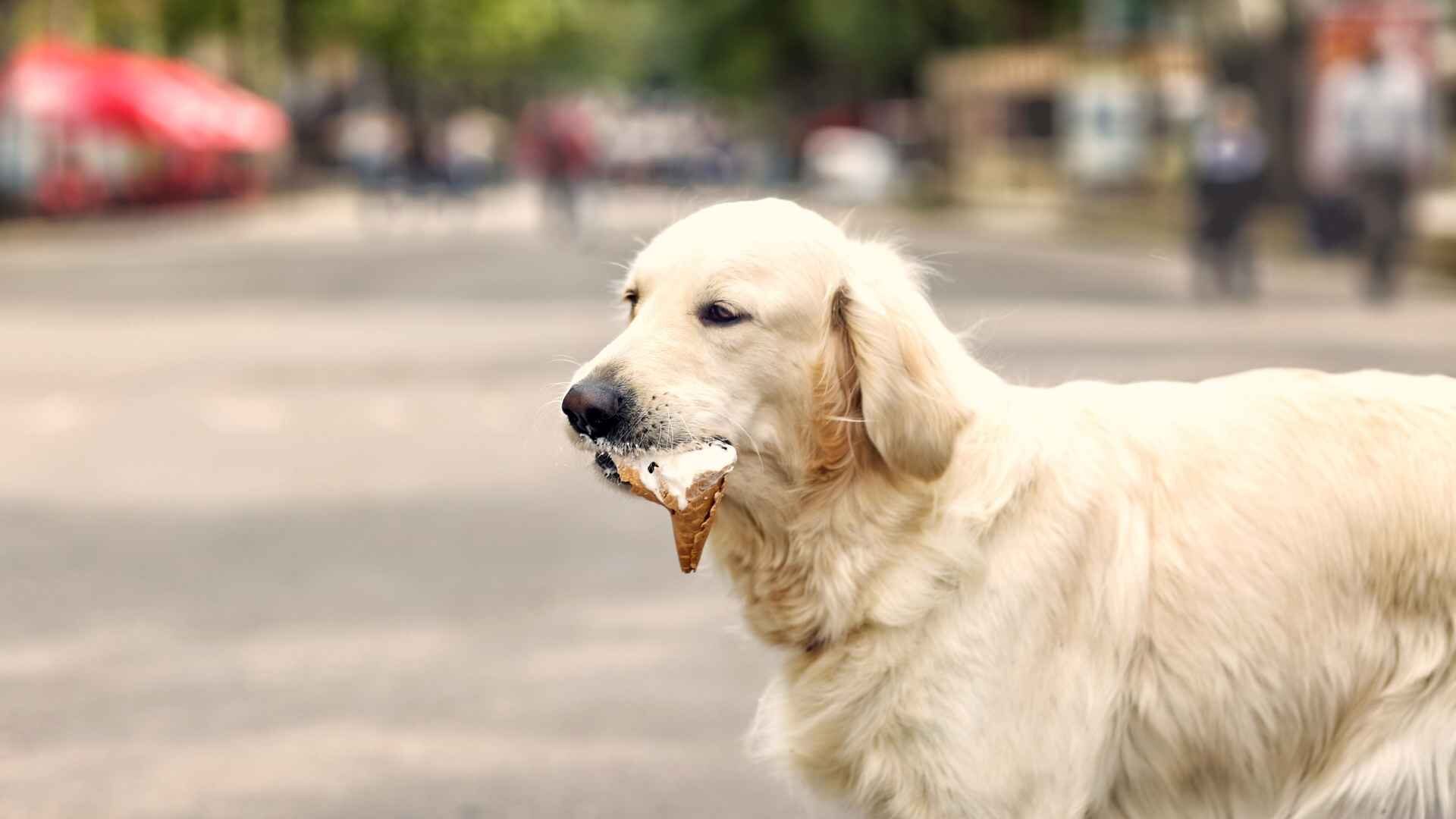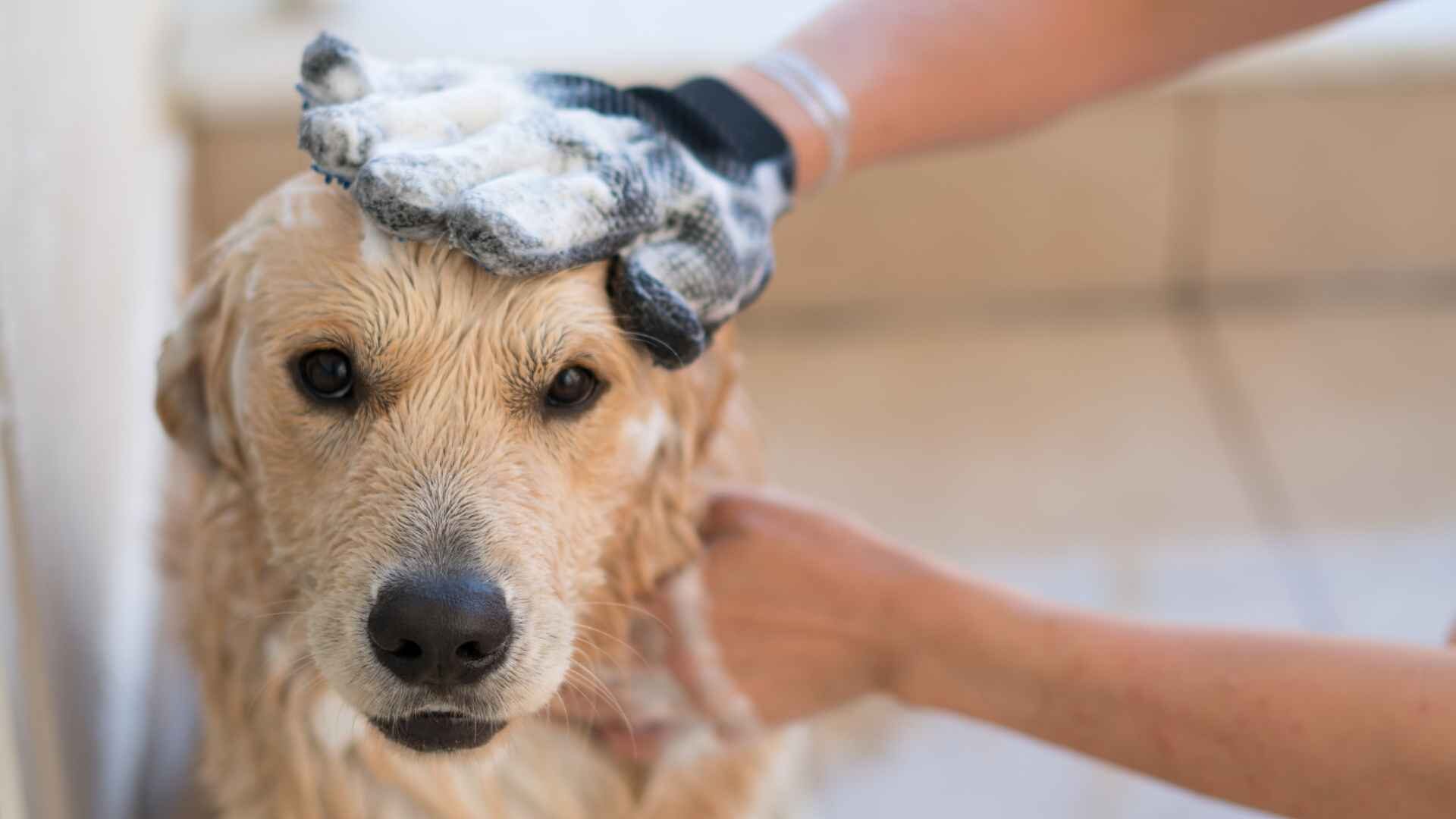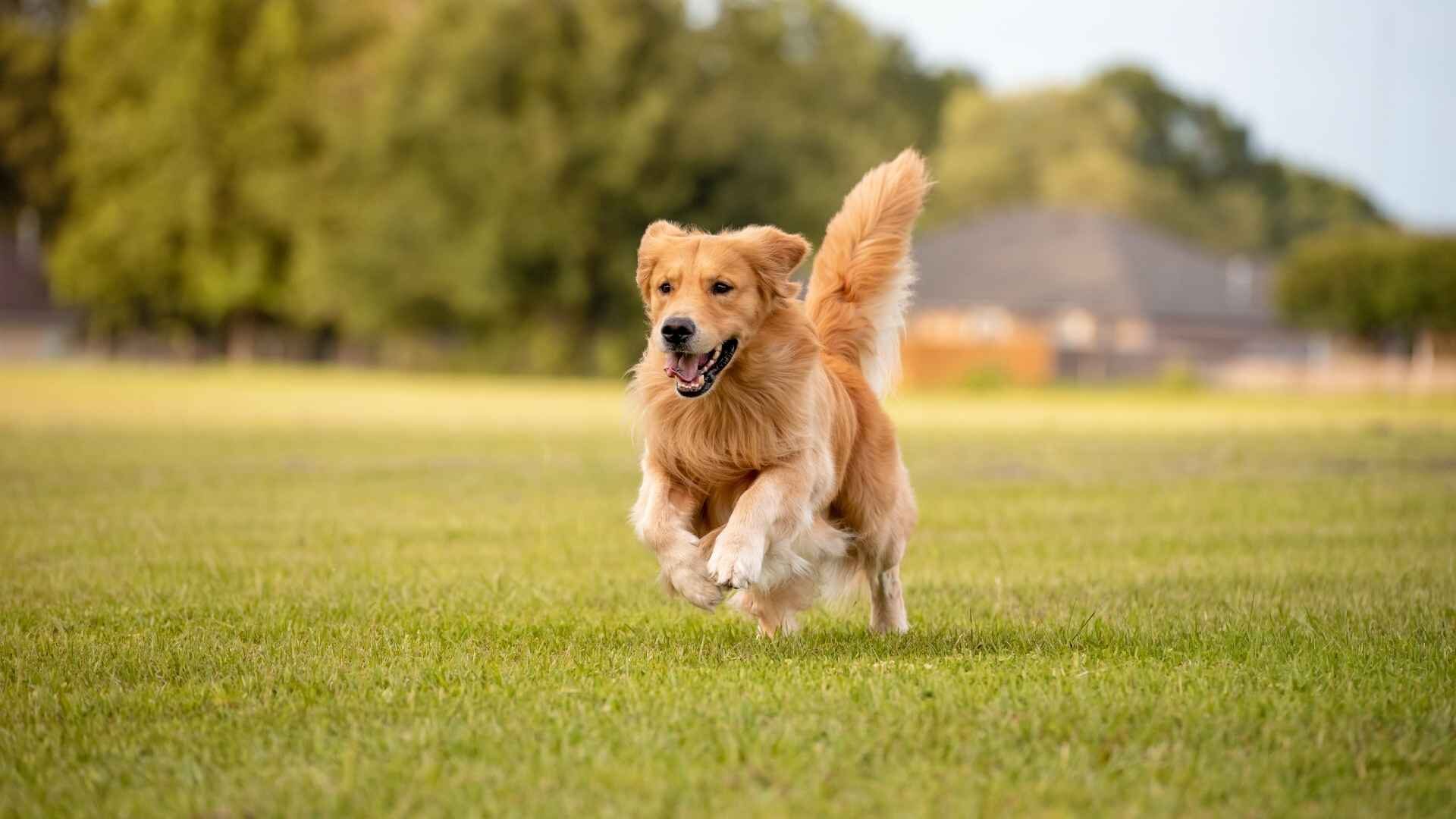Who can blame you if your heart’s desire is a Golden Retriever? For a good reason, Golden Retrievers are the third most popular dog. Because of their kind, friendly, and trainable nature, they’re a popular choice among pet owners.
If you live in an apartment, you may already know that Golden Retrievers are fantastic companions, great with youngsters, and friendly and outgoing. It doesn’t matter if you live in a studio or a one-bedroom apartment if you can’t have a pet of your own. The extra work will be well worth it, even if you have to make some sacrifices or adjust for a while.
Are Golden Retrievers good apartment dogs?

Many people believe that giant dogs are too big to live in apartments. Because of their size, large dogs are expected to demand more room. A Golden Retriever is a dog that many people would like to have but cannot since they live in an apartment. The good news is that Golden Retrievers can thrive in apartments, provided the correct amount of attention is given to their requirements.
Even though they’re enormous dogs, they don’t need a lot of room to live in. Goldens require little more than food and drink, a comfy place to sleep, and the company of their family members to be happy and content in their homes. If properly cared for, Golden Retrievers make excellent apartment pets because of their easy-going nature. Owning one of these sweet, affectionate dogs can still be a reality for you, no matter how little your living area is.
How can Golden Retrievers make good apartment dogs?
When it comes to energy, Golden Retrievers are unstoppable. They’re always up for a good time and enjoy playing with one other. Because of this, Golden Retrievers require at least two hours of daily exercise. You may ask if these enormous, rambunctious dogs are suitable for apartment living.
As a result, are Golden Retrievers able to live in apartments? Even though living in an apartment isn’t ideal for a Golden Retriever, they can nonetheless survive in a small setting. Thousands of Goldens are actually living in residential complexes. Dogs can adjust to a tiny living environment if they are given appropriate physical and mental stimulation, as well as crate training, obedience, and socialization training.
1. The best ways to keep your golden retriever active
A Golden Retriever’s high degree of activity is characteristic of the breed as a whole. In an ideal world, you’d have a wide backyard for them to go about it so they can get some exercise on their own. However, if you’re going to be living in an apartment, this won’t be the case.
So now what? Being in an apartment, you’ll have to take care of their regular exercise routine. The average dog will require at least two hours of exercise per day, and that’s only the beginning. If you don’t have the time or energy to do this, I recommend moving or simply not owning a car.
“Exercise,” on the other hand, isn’t just going for a brisk walk around the block. Even though they enjoy their daily walks, Golden Retrievers require more vigorous exercise. What to do with your dog if you have no idea? We’ve got your back.
2. Stimulating the mind is a need
Mental stimulation is equally as vital as physical activity, if not more so. A Golden Retriever in an apartment needs mental stimulation, but what does that mean? Dogs need mental activity to keep their minds sharp, and this is what is meant by “mental stimulation.”
The more intelligent a dog is, the more likely they are to require this. It’s also worth noting that Golden Retrievers are some of the most intelligent dogs in the world. Is it possible that Einstein would be happy to sit in front of the television all day?
Even if you and your Golden Retriever spend the entire two hours of your day playing catch, they may still be uncomfortable and restless at home. But the problem is that your approach falls short in key areas. According to the adage, “a happy dog is a cognitively stimulated dog.”
3. Golden retriever crate training
Yes, all dogs should be crate trained. However, for dogs that spend most of their time indoors, this is extremely important. To top it all off, you won’t have a backyard to keep your dog (please don’t put them on the balcony) in an apartment. What is crate training, and why is it so important?
Your Golden Retriever will be able to maintain urine and bowel control indoors with the help of this training method. This is a need if you plan to live with your dog in an apartment and don’t want them to soil the place. What is the process of crate training? Dogs, by nature, are reluctant to defecate in their sleeping areas. Then they’ll regulate their “business” until you allow them out of their boxes.
When the dog is a puppy, this is a must. Remember that you don’t want to leave your Golden Retriever in the crate all day while you’re working. It’s best to keep puppies out of there for no longer than six to eight hours at a period. It’s also important that the crate is large enough.
4. A puppy’s first steps towards socialization
Your puppy should be exposed to a wide variety of people and animals during its first few years of life. So that when kids grow older, they will be less fearful or worried when confronted with real-world situations. There may be a lack of amicable temperament in a Golden if they are not socialized.
Why is it so vital for a Golden Retriever living in an apartment to get socialization training? An apartment complex presents a diverse mix of residents and canines for the dog. When someone or a pet walks by, you don’t want your dog to start barking at them, do you?
Not to mention that a dog that barks incessantly at your neighbors’ windows can be a genuine nuisance to those with whom you share a wall. In the end, socialization training is just a way to ensure that your Golden Retriever is always at his or her best.
5. Using golden retrievers for obedience training
We’ve already talked about how and why a Golden Retriever in an apartment needs mental stimulation. These canines will benefit much from obedience training, as well. However, I’d want to delve deeper into the topic of obedience and explain why it merits a second mention.
It’s not like you’re living on a farm, where the next neighbor may be a few miles away. When you have a Golden Retriever, you’ll be continuously bombarded with a variety of stimuli. After all, they’re wired to respond.
That being said, it’s a good idea to give your Golden Retriever some obedience training. Although competing in a dog trick championship would be fun, I don’t think it’s necessary to make an effort to teach your dog a specific skill.
7 Important things to consider when getting a dog for an apartment

Finding a trustworthy breeder is the first and most critical step in finding your new best friend. Even after you’ve brought home a new best friend, you can always count on breeders for advice and support.
For all of your questions about dogs, think of a breeder as your very own personal trainer. Preparation is key before making a commitment to a breeder, as it is with any major decision. Here are a few pointers for locating a reputable breeder and dealing with them.
1. Find out more about the breeder
You can learn more about a breeder by meeting them face-to-face at their kennel or at their home. However, if you are unable to meet your breeder and their dogs in person at COVID-19, offer to meet them via an online video conferencing system instead.
It’s important to pay attention to the dogs and their trainer: Is the place tidy? Odor-free? Is the breeder truly in love with dogs? Is the dog’s diet adequate? Observe how the dogs interact with the breeder, as well as with others. When meeting a new person, both dogs and pups should be friendly and approachable.
2. You can see the pup’s parents
Look at your dog’s parents, and you’ll have a good idea of how he or she will grow up! Your dog’s attitude, size, and looks will all be shown in this.
3. Medical history should be obtained
The O.F.A. and C.E.R.F. certificates that a reputable breeder will be pleased to provide as proof of health screening are two examples. In addition, they’ll go over any health issues that are common in that breed, so you know what to look out for.
4. Dogs have been shown to lower blood pressure and improve heart health
Being a dog owner is linked to a longer lifespan. Dog owners had a decreased mortality risk, according to a study of papers published between 1950 and 2019. Dog owners have been shown to have lower blood pressure and better responses to stress, according to research.
People who have had past coronary episodes have a lower risk of death even when they only share their homes with a dog. Stress, a major contributor to cardiovascular disease, is reduced by the close relationship between humans and dogs.
5. Keep calm and carry on
Puppies don’t come home with you the same day you meet their breeder. For the first two to three months of a puppy’s life, the breeder often keeps it at the kennel with the mother and other puppies in the litter. In order to prepare for the arrival of your new pet, you’ll need some time to prepare your home and stock up on supplies.
6. Out of our breeder of merit and H.E.A.R.T. programs
All puppies born to B.O.M.s will be healthy, well-socialized, and well-preserved in the A.K.C.’s Breeders of Merit Program (B.O.M.). Learn more about the Breeder of Merit program or locate puppies for sale from Breeders of Merit in the A.K.C. Marketplace. ‘ You can learn more about the Bred with HEART program or find pups from Bred with HEART breeders in A.K.C. Marketplace if you are interested in doing so. Keep these things in mind once you’ve found the breeder of your dreams:
7. Do some research on your puppy’s ancestry and get proof of it
Do not leave the grounds of a breeder’s establishment without obtaining the necessary paperwork to prove your puppy’s pedigree or “papers.” The American Kennel Club’s logo and the words “American Kennel Club” should be prominently displayed. If a breeder is reluctant to provide you with A.K.C. papers, wants to charge you more for them, or says they will be mailed to you later, be suspicious.
Why Golden Retrievers in apartments can be bad?

Golden Retrievers make wonderful pets for families, and they’re also great for people who are just getting into dog ownership for the first time. They’re the third most popular canine in the United States, and for a good reason, too!
There are many families who live in apartment complexes, making the question of whether or not a Golden Retriever may live there natural. Golden Retrievers can live in apartments if their physical, mental, and social needs are all being satisfied. However, there are drawbacks to apartment living that should be taken into account.
Dogs are not allowed in all flats; there are weight and size restrictions, noise, toilet breaks, and damage to property are all possible difficulties. There are a few things to consider before bringing your Golden Retriever into an apartment, but it is possible.
Golden Retrievers: Factors to Consider and Possible Limitations Because of this, apartments, as opposed to other types of dwellings like single-family homes or farms with large acreages, do provide some particular issues for Golden Retrievers.
How to channel Golden Retriever’s energy in apartment?

The majority of goldens prefer to be close to their owners. In addition, they enjoy being petted and being the center of attention. In some cases, they’ll go to great lengths to get our attention. They may leap, grasp our hands or arms, or engage in other harmful actions.
Several common issues with the behavior of golden retrievers will be discussed in this article. Dogs may be trained and exercised to change many of these behaviors. Animal Behaviour: Normal versus Abnormal Dogs do a lot of things by nature, including digging, barking, showing fear, marking territory, chasing mice, and jumping.
They may even try to scavenge for food. Or, maybe they’d rather spend all their time with us. Golden Retrievers were developed to be social and energetic canines. They’re bred to be retrievers.
1. Getting on top of others
When it comes to golden retrievers, it’s rare that they meet a stranger. It is, however, this warmth that might get them in trouble. Goldens are the dog world’s “welcome committee.” In many cases, dogs will want to jump on their owners when they first meet them.
But if it’s a 5-pound Maltese rather than a 70-pound golden, it’s a different story. Unintentionally knocking someone down is a possibility when the golden greets you with his eager enthusiasm. Even more harmful for youngsters is that he will just toss them around when thrilled.
2. Conducting self-destructive actions
Goldens were developed for hunting as well as companionship. They’ve got a lot of energy left over. They were also raised to be retrievers that always had something in their mouths. As a result, if we fail to match their demands for physical activity and cerebral stimulation, they will devise their own solutions.
And in general, we will not be in agreement with their behavior. The garden may be ruined by them. Or they’ll eat our carpets and rugs. They could also snatch the food from the counter. In addition, some of the foods they eat, such as chocolate and raisins, may be harmful to them. Towel or sock ingestion can cause obstructions in the digestive tract. It’s possible for a bored, under-exercised golden to come up with novel solutions to his requirements.
3. Mouthing
One of the “mouthier” breeds is the golden retriever, which is the retriever. They frequently require something to eat or drink. It is possible for a golden retriever to become quite mouthy if he isn’t properly taught that we are not a chew toy or pheasant he is retrieving.
That is, he may try to grip our garments, arm, or hand in his mouth at all times. We don’t want to be a squeaky wheel either. Canine biting is a normal part of their life. Puppies, on the other hand, need to learn biting inhibition. Biting and breaking skin is something we don’t want to see happen to our dogs. While it may be natural for him to speak softly, the behavior is nevertheless irritating. It can also be harmful. A person can be severely injured or even dragged to the ground.
4. Hyperactivity
Some goldens appear to be bouncing around like a ball on a trampoline. They’re like a tornado whizzing through the house. Furniture has been sanitized. Shredded pillows litter the floor. But your happy golden is wagging his tail frantically, searching for the next item that might let him expend his surplus energy.
5. Anxiety about departure
Goldens are more likely than other breeds to have separation anxiety because of their naturally loving and family-oriented demeanor. Unwanted actions may result as a result of their insatiable demand for constant contact with us.
Drooling, pacing, and whining are all signs that a dog is suffering from minor separation anxiety. This can lead to a lot of destruction in dogs that suffer from extreme separation anxiety. It’s possible that they’ll try to break out of windows and doors by frantically digging around in the jambs. In their desperation to escape, they may injure themselves seriously.
6. Pulling on the leash
It’s in their nature to meet new people and show off their kind demeanor. Their primary concern is getting there as fast as possible, however. There are several dogs who are known to be aggressive when on a leash, but not all of them are as nice as goldens.
In addition, they have the ability to focus like a laser on achieving their objectives. When a golden retriever is on a leash, it can injure someone. Pulling down a business owner puts them at risk for injury. You never know if he’ll be able to get free and end up hurt or perhaps dead.
7. Trying to get your way
Goldens are naturally friendly, and they may like to be the center of attention because of this. They adore spending time with us since they are so family-oriented. The barking of certain goldens is a sign of their need for attention. As a way to get your attention, they may push and pinch you. Some may even engage in undesired activities, such as removing something from the table from the discussion. Even unfavorable media coverage counts as media exposure.
Watch Can golden retrievers stay alone at home | Video
If you live in an apartment, how well do Goldens do?
They may be large dogs, but they don’t require a lot of room to live in. Inside their houses, all that Goldens need is food and drink; a cozy bed to sleep on; and the company of their family. With the right amount of attention, Golden Retrievers can thrive in an apartment setting.
Pooping places for apartment dogs?
While some apartment dwellers are fortunate enough to enjoy a tiny courtyard or garden, many will have to make do with a small balcony or possibly no outdoor area. An in-home toileting system is a fantastic idea because it is not always possible to take your dog out to the street two or three times a day.
What’s the harm in getting a Golden Retriever?
The amiable, people-loving character of Golden Retrievers is one of the things that makes them “Golden.” When they don’t have a lot of interaction with you, this attribute causes them to be quite dissatisfied. Restricted outside time might cause a Golden to become aggressive and loud.
Is it safe to keep a Golden Retriever indoors or out?
Dogs should not be left outside for long periods of time, especially Golden Retrievers. Family dogs and golden retrievers thrive in homes with lots of people. If you leave your pet out in the elements, you may encounter behavioral concerns, terrible weather, theft, escape, and outdoor risks.
What is the best place for my puppy golden retriever to sleep?
There are many options here: a dog box, dog bed, blanket, and so on. Remember to bring nice cloth for your pet’s comfort. With food or a toy, lure your dog into the sleeping area. In order to make him/her feel more at ease, all it takes is a little petting and cuddling.
Conclusion
I love golden retrievers because they’re so kind and joyful. Because of this, they are more likely than other breeds to engage in some undesirable habits, such as excessive barking and excessive chasing. In order to address their needs and teach them correct behavior, it is vital to do so. The lives of the people we care about and our own will be better for it. All that a golden retriever needs to live comfortably is food, water, and a comfortable bed.
In order to make a Golden retriever a good apartment dog, you need to know how much space you have in your apartment and how many pets are allowed in the complex, how much the pet deposit is, and how much your dog weighs, as well as their energy level, vocalizations, bathroom habits, and walking routes. In general, golden retrievers are easy to understand. As long as their basic daily requirements are addressed, and they get to spend time with the people they care about, apartment dogs will be content.
Bottom up
Please comment below about your ideas and share this “Are Golden Retriever Good Apartment Dogs: Guide with 7 Tips” article with your friends.
Stay tuned with our website to find out more exciting stuff. Don’t forget to check out our previous articles too.
Until the, Read about, Why Do Golden Retrievers Like Socks: Guide with 7 Reasons





